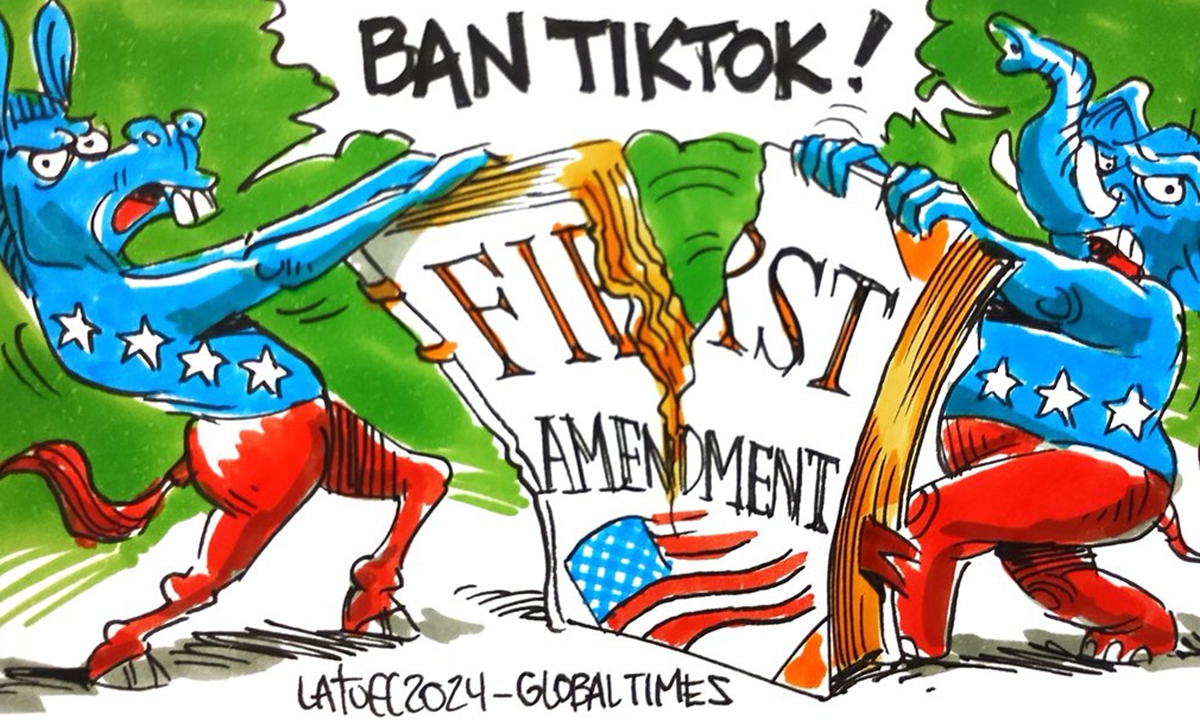
The US' crackdown on TikTok tramples upon its First Amendment rights. Cartoon: Carlos Latuff
The US has begun a new round of hunting and robbing TikTok. The US House of Representatives Energy and Commerce Committee voted 50-0 on Thursday to pass a legislative proposal, giving Chinese company ByteDance two choices: either divest its ownership of TikTok within 165 days once the law is enacted or have it banned from the major app stores in the US. This is actually forcing ByteDance to choose between two bottles of poison. Reuters said the vote is the most significant in the US crackdown on TikTok since former president Donald Trump unsuccessfully tried to ban the app in 2020. Compared with the White House's previous refusal to comment on the bill, White House press secretary praised the bill on the day of the vote, which is considered a step forward by the White House.
The US House of Representatives will vote on the bill as early as next Monday. Many analysts believe that it will not be easy to pass it this year. But the very fact that this kind of "law" can be proposed sends a worrying signal that some politicians have no change in their will to politicize business issues. In fact, TikTok has been subject to various forms of probe and investigation by the US for quite some time. During this period, TikTok CEO Shou Zi Chew was publicly questioned by Congress twice. Some congressmen's "McCarthy-style" questioning of Chew and his decent response spread throughout the world via social media. The image of free speech and rule of law in the US is in tatters, and the latest bill is simply further evidence of this.
The US has constantly attempted to rob TikTok, regardless of whether it is the Republican Party or the Democratic Party and whether it is government or Congress, reflecting the high degree of consensus and collusion among some American political elite on this issue. The complex and chaotic public opinion atmosphere created during the election year has become an inducement and cover for Washington to carry out "political robbery." Drawing on its previous "experience" and "lessons," some strategic adjustments and packaging were made to the robbery of TikTok this time, but the essence has not changed. The one-size-fits-all excuse of "national security threat" is still being used. The groundless "presumption of guilt" without any evidence is still applied, and the utter violation of the principles of market economy and fair competition is being adopted.
Objectively speaking, they had thought about doing it in a more "civilized" manner and making it look more reasonable in terms of procedure. For this reason, after they pre-judged TikTok as "guilty," they used a microscope to look for "evidence," but in the end found nothing; they summoned TikTok's CEO to Congress for questioning like a prisoner, but it turned out that they themselves became a joke. After trying to inflame the issue several times, it was further proven that TikTok was operating legally in the US and had not violated any American laws. This made them unable to rob in a "civilized" way, but to rob it openly.
TikTok has 170 million users in the US, accounting for half of the country's total population. Even Joe Biden's campaign team recently created an account on TikTok. The success of TikTok in the US is not only due to the success of its business model but also because TikTok has excelled in terms of compliance, even more strictly than many American companies. This is a consideration in the minds of all businesses operating in the US. They cannot ignore the fate of TikTok. Today, TikTok is like a defensive line. If this line is breached, many foreign companies operating in the US and American consumers behind the line are exposed to the risk of a potential "robbery" at any time.
According to reports, Mike Gallagher, the anti-China lawmaker proposing this bill and chairman of the "House Select Committee on the Strategic Competition Between the United States and the Chinese Communist Party," claims that this bill can be seen as "a surgery designed to remove the tumor and thereby save the patient in the process." In fact, what needs to be removed is the malignant tumor represented by these politicians advocating US hegemony and a robber mentality. Only by doing so can it benefit the national and social health of the US. Actually, every time the US issues threat and intimidation against TikTok, the US' business environment and international image will degrade to a great extent. Even the Singaporean Ambassador to the US publicly stated that the campaign against the company had been "taken too far," and interrogations such as those experienced by Chew "can sometimes possibly undermine the image and understanding of how the US is viewed in different parts of the world."
We have also noticed that the mainstream US media, which has consistently focused on China's business environment, has surprisingly chosen to "make no comments" on the TikTok issue. However, this does not mean that there is no opinion about it within American society. It has been reported that in the past few days, the phone lines of congressional offices have been flooded with calls from TikTok supporters. The US not only prides itself on being the most mature rule-of-law country, but also positions itself as a world leader. However, many of its actions are self-defeating, violate the principles of the rule of law and market norms, and undermine its international credibility. This is a process of the US losing its global leadership status while descending into self-destruction. From a certain perspective, American people coming forward to defend TikTok's legitimate rights is fundamentally about safeguarding the international image and reputation of the US. This point is quite clear.




